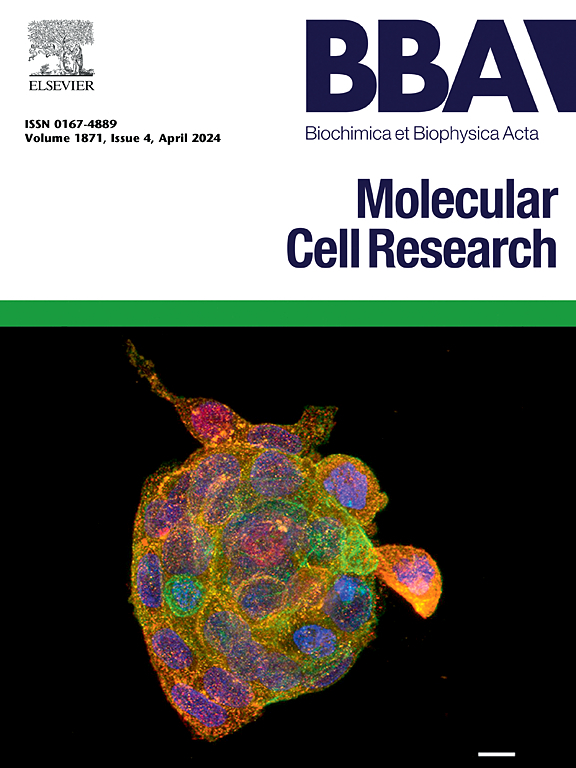GPSM1 interacts and cooperates with MMP19 to promote proliferation and EMT in colorectal cancer cells
IF 4.6
2区 生物学
Q1 BIOCHEMISTRY & MOLECULAR BIOLOGY
Biochimica et biophysica acta. Molecular cell research
Pub Date : 2025-01-22
DOI:10.1016/j.bbamcr.2025.119903
引用次数: 0
Abstract
Among patients with colorectal cancer (CRC), metastasis accounts for the majority of deaths, and epithelial–mesenchymal transition (EMT) is important in the metastatic process. However, the mechanism underlying the correlation between the two in CRC is unknown. Here, we verified that a receptor-independent protein, G-protein signaling modulator 1 (GPSM1), was increased in CRC and had a significant positive correlation with matrix metalloproteinase 19 (MMP19). GPSM1 and MMP19 knockdown or overexpression decreased and increased proliferation, migration and invasion of CRC cells, respectively. In addition, overexpression or knockdown of GPSM1 and MMP19 upregulated and inhibited EMT, respectively. Interfering with MMP19 reversed EMT activation via GPSM1 overexpression. Apoptosis was induced by GPSM1 and MMP19 knockdown and activated the caspase3/Bcl-2/Bax signaling pathway. In conclusion, these results support the role of GPSM1 and MMP19 in CRC progression.
GPSM1与MMP19相互作用并协同促进结直肠癌细胞的增殖和EMT。
在结直肠癌(CRC)患者中,转移是死亡的主要原因,而上皮-间质转化(EMT)在转移过程中起着重要作用。然而,两者在结直肠癌中相关的机制尚不清楚。在这里,我们证实了一种不依赖受体的蛋白,g蛋白信号调节因子1 (GPSM1)在CRC中增加,并且与基质金属蛋白酶19 (MMP19)有显著的正相关。GPSM1和MMP19敲低或过表达分别降低和增加结直肠癌细胞的增殖、迁移和侵袭。此外,GPSM1和MMP19的过表达或敲低分别上调和抑制EMT。干扰MMP19可通过GPSM1过表达逆转EMT激活。GPSM1和MMP19敲低诱导细胞凋亡,激活caspase3/Bcl-2/Bax信号通路。总之,这些结果支持GPSM1和MMP19在结直肠癌进展中的作用。
本文章由计算机程序翻译,如有差异,请以英文原文为准。
求助全文
约1分钟内获得全文
求助全文
来源期刊
CiteScore
10.00
自引率
2.00%
发文量
151
审稿时长
44 days
期刊介绍:
BBA Molecular Cell Research focuses on understanding the mechanisms of cellular processes at the molecular level. These include aspects of cellular signaling, signal transduction, cell cycle, apoptosis, intracellular trafficking, secretory and endocytic pathways, biogenesis of cell organelles, cytoskeletal structures, cellular interactions, cell/tissue differentiation and cellular enzymology. Also included are studies at the interface between Cell Biology and Biophysics which apply for example novel imaging methods for characterizing cellular processes.

 求助内容:
求助内容: 应助结果提醒方式:
应助结果提醒方式:


